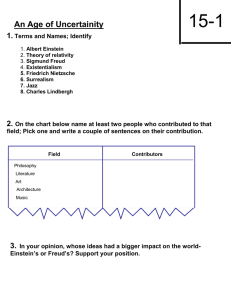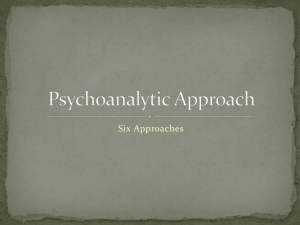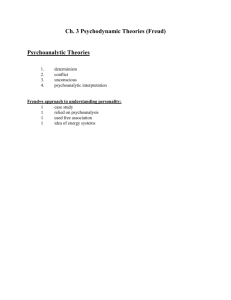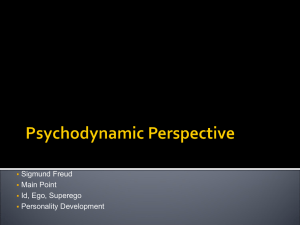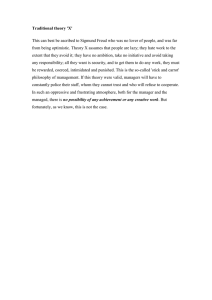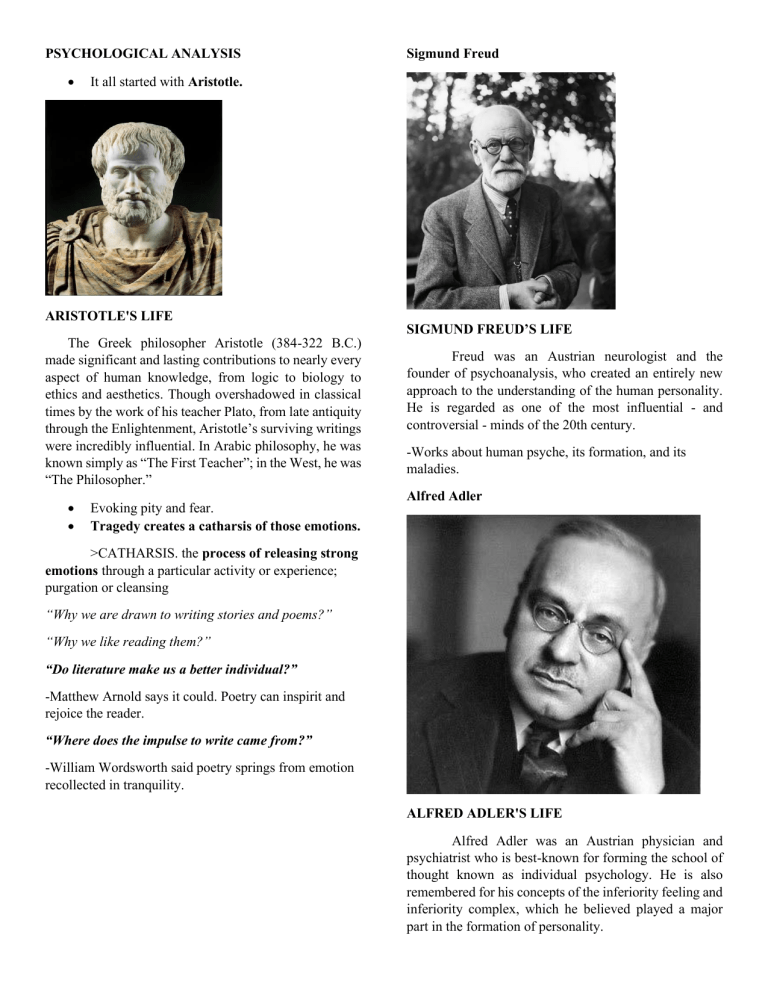
PSYCHOLOGICAL ANALYSIS • Sigmund Freud It all started with Aristotle. ARISTOTLE'S LIFE SIGMUND FREUD’S LIFE The Greek philosopher Aristotle (384-322 B.C.) made significant and lasting contributions to nearly every aspect of human knowledge, from logic to biology to ethics and aesthetics. Though overshadowed in classical times by the work of his teacher Plato, from late antiquity through the Enlightenment, Aristotle’s surviving writings were incredibly influential. In Arabic philosophy, he was known simply as “The First Teacher”; in the West, he was “The Philosopher.” • • Evoking pity and fear. Tragedy creates a catharsis of those emotions. Freud was an Austrian neurologist and the founder of psychoanalysis, who created an entirely new approach to the understanding of the human personality. He is regarded as one of the most influential - and controversial - minds of the 20th century. -Works about human psyche, its formation, and its maladies. Alfred Adler >CATHARSIS. the process of releasing strong emotions through a particular activity or experience; purgation or cleansing “Why we are drawn to writing stories and poems?” “Why we like reading them?” “Do literature make us a better individual?” -Matthew Arnold says it could. Poetry can inspirit and rejoice the reader. “Where does the impulse to write came from?” -William Wordsworth said poetry springs from emotion recollected in tranquility. ALFRED ADLER'S LIFE Alfred Adler was an Austrian physician and psychiatrist who is best-known for forming the school of thought known as individual psychology. He is also remembered for his concepts of the inferiority feeling and inferiority complex, which he believed played a major part in the formation of personality. Alder was initially a colleague of Sigmund Freud, helped establish psychoanalysis, and was a founding member of the Vienna Psychoanalytic Society. Adler's theory focused on looking at the individual as a whole, which is why he referred to his approach as individual psychology. Otto Rank Carl Jung, in full Carl Gustav Jung, (born July 26, 1875, Kesswil, Switzerland—died June 6, 1961, Küsnacht), Swiss psychologist and psychiatrist who founded analytic psychology, in some aspects a response to Sigmund Freud’s psychoanalysis. Jung proposed and developed the concepts of the extraverted and the introverted personality, archetypes, and the collective unconscious. His work has been influential in psychiatry and in the study of religion, literature, and related fields. • • Has the interest to literary critics Provides the concepts of collective unconscious, myths and archetypes “They all Probe the work of the human psych to understand why people act as they do. “ THE FREUDIAN PRINCIPLES 1. The Unconscious & Tripartite Psyche. OTTO RANK'S LIFE SUPER EGO, EGO, ID Otto Rank was an early 20th century psychologist and psychoanalyst and a close colleague of Sigmund Freud. Otto Rank was born on April 22, 1884 in Vienna. When he was 21, Rank met Sigmund Freud, after Freud had read a manuscript written by Rank. Freud subsequently appointed Rank to act as secretary of the Vienna Psychoanalytic Society in 1906. The two became friends and were close confidants, with Rank acting as Freud’s assistant for nearly two decades. Freud encouraged Rank to study at the University of Vienna, where Rank earned his PhD in 1912. Rank and Freud worked together to expand Freud’s theories, and Rank was a co-founder of the International Psychoanalytical Association in 1910. Rank was a prolific psychoanalytic writer, second only to Freud, and served as the resident expert on philosophy and literature in the Vienna Psychoanalytic Society. Our actions are result of forces we do not recognize and therefore cannot control 2. The Significance of Sexuality Carl Jung The Oedipus/Electra Complex • CARL JUNG'S LIFE -occurs in Phallic stage of psychosexual development • • • • Reveal what is happening in the character’s unconscious as suggested by images, symbols, or interior monologue. The Importance and Interpretation of Dreams • Identify the nature of the character’s conflicts. -Dreams are the language of the unconscious. • Changes in the outlook or behaviors signal that some struggles has been resolved. -Most important contribution of Freud to literary criticism. • Does the character operate in id, ego, or super ego? • Examine the behavior. Is it balanced or dominated by superego or id? • Look carefully at any dreams. • Probe meanings of symbols by thinking about them in terms of their maleness and femaleness. • Find some particular behavior that a character is fixated on. • Note any conflict or events in the author’s life that are reflected on the text. -feeling of desire for opposite-sex parent -competition with same-sex parent Electra (girl-father), Oedipus (boy-mother) DREAMWORK The unconscious thoughts are hidden and repressed CONDENSATION DISPLACEMENT CONDENSATION-When many ideas appear as one idea in a dream (e.g snake) DISPLACEMENT-Directing emotions or actions toward a safe or unimportant dream images. (e.g upset with someone or something harmless person or thing) SYMBOLIZATION- acting out the repressed urge in a symbolic act. …mostly sexual in nature CREATIVITY- Expression of writer’s unconscious mind. Drafting and Revising: The Conclusion • A brief reiteration of the major points followed by a general conclusion. Psychological Analysis • • • • -the analysis of an author’s unintended message The main goal is to analyze the unconscious elements within a literary text based on the background of the author. The actions of literary characters are analyze using the three personality structures that Freud identified. The authors 'own childhood traumas, family life, sexual conflicts, fixations and such will be traceable within the behavior of the characters in the literary work. WRITING PSYCHOLOGICAL CRTICISM Drafting and Revising: Introduction • Announce the primary focus. • Comment on similarities and differences between the work which you are dealing and other works by the same author. Drafting and Revising: The Body WRITING PSYCHOLOGICAL CRITICISM Prewriting Once you are accustomed to taking a Freudian, mythological, or Lacanian approach, you will begin to notice meaningful symbols arid will pay close attention to dream sequences as a matter of course. If you are not used to reading from these perspectives, however, you may want to be intentional about noting aspects of a work during prewriting that could be significant. If you are interested in using Freudian theory, you can begin by making notes about a selected character, then writing a descriptive paragraph about him or her. You can use the following questions to get started: 1. What do you see as the character's main traits? 2. By what acts, dialogue, and attitudes are those traits revealed? 3. What does the narrator reveal about the character? 4. In the course of the narrative, does the character change? If so, how and why? 5. Where do you find evidence of the id, superego, and ego at work? 6. Does the character come to understand something not understood at the outset? 7. How does the character view him- or herself? 8. How is he or she viewed by other characters? 9. Do the two views agree? 10. What images are associated with the character? 11. What principal symbols enrich your understanding of the characters? 12. Which symbols are connected with forces that affect the characters? 13. Does the character have any interior monologues or dreams? If so, what do you learn from them about the character that is not revealed by outward behavior or conversation? 14. Are there conflicts between what is observable and what is going on inside the character? Are there any revealing symbols in them? 15. Are there suggestions that the character's childhood experiences have led to problems in maturity, such as uncompleted sexual stages or unresolved dilemmas? 16. Where do the characters act in ways that are inconsistent with the way they are described by the narrator or perceived by other characters? 17. Who is telling the story, and why does the narrator feel constrained to cell it? How can you explain a character's irrational behavior? What causes do you find? What motivation?

